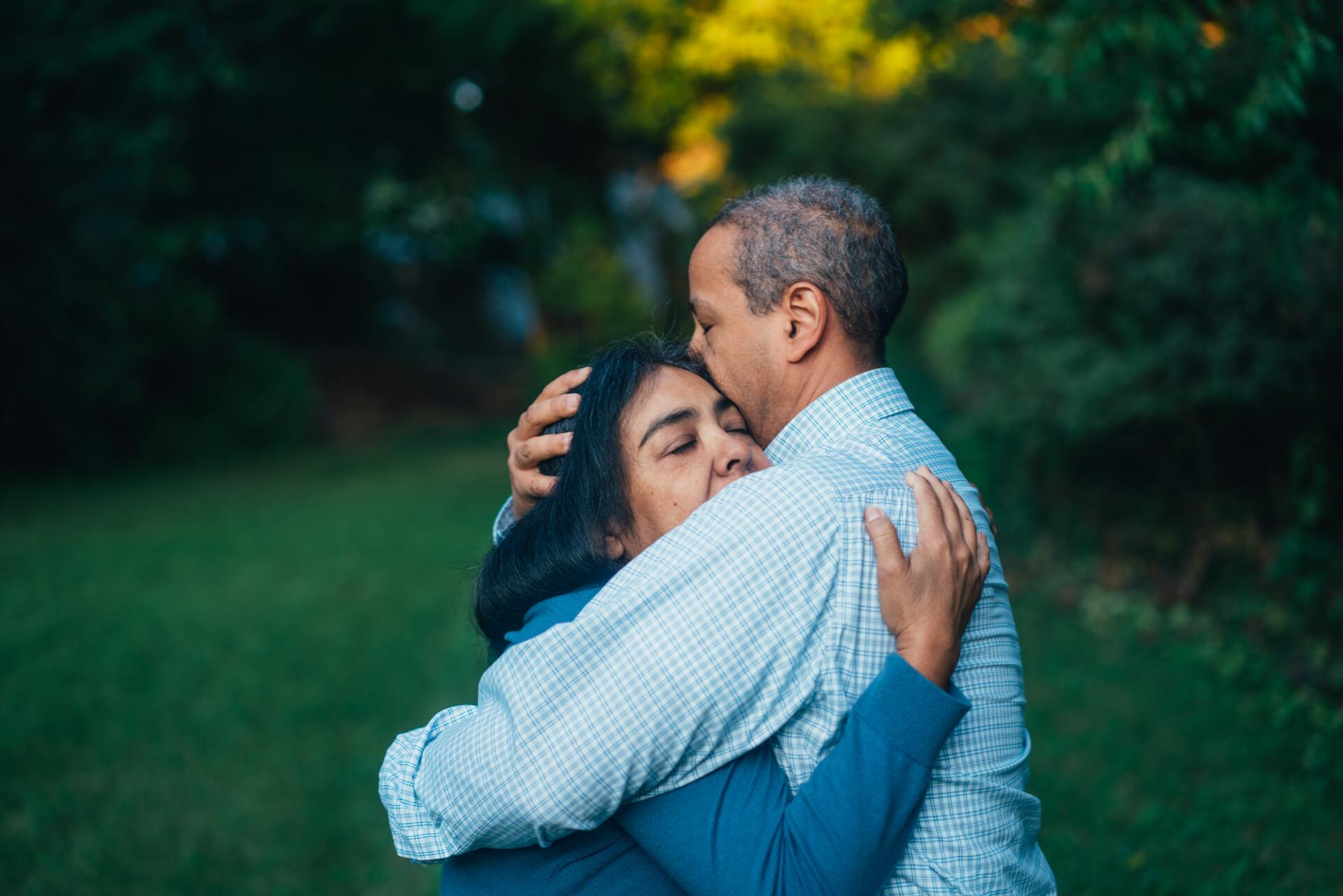Let’s Talk About Evidence: Mindfulness
Mindfulness has been shown to support cancer survivors, warriors, and their caregivers in a number of ways. Although it is by no means a cure for cancer, the art of centering the mind and body in the present moment is an important part of any holistic plan for living with and treating the disease. Like all of the interventions we teach on our app, mindfulness can help everyone affected by cancer, and is perfect for complementing traditional medical treatment. Here, we lay out the evidence, to show you why mindfulness meditation is so beneficial for anyone whose life has been impacted by cancer.
Stress Reduction and Other Mental Health Benefits
The stress that cancer causes can feel all-encompassing. Like a wave that begins to swell at diagnosis, it threatens to crash down upon us at the slightest provocation – which, after a certain point, can be pretty much anything! It is well known that stress is detrimental to our wellbeing, but it is especially important to engage in stress-reducing activities when embarking on the road to recovery. This is because stress can negatively affect the process of healing from cancer by slowing down and reducing immune system function
(1) and has the potential to increase the likelihood of a tumour’s metastatic spread (as has been shown in animal models) (
2 ). Luckily, mindfulness has proven stress-reduction and other mental health benefits that have been specifically shown in people affected by cancer:
- Four separate studies assessed the effect of Mindfulness-Based Stress Reduction techniques such as mindfulness theory, meditation, yoga, and problem solving on the mental and physical wellbeing of people with an active cancer diagnosis ( 3 , 4 , 5 , 6 ). Together, they showed a dramatic reduction in stress, anger, anxiety, depression, and confusion symptoms, as well as a significant improvement in coping capacity and immune response. Two of the studies ( 5 , 6 ) also showed increased ‘post-traumatic growth’ in the participants!
- Another study assessed the efficacy of Cognitive-Based Compassion Training (CBCT) for adults who had been diagnosed with breast cancer in the last fifteen years, but who were cancer free and not on active treatment. The participants exhibited a significant improvement in self-awareness and self-compassion , and CBCT was shown to be effective in reducing stress caused by fear of cancer recurrence ( 7 ).
- Adult patients with any cancer diagnosis (early stage or recurrent) other than brain cancer participated in an eight-week Mindfulness-Based Art Therapy (MBAT) . The results showed that MBAT significantly improved the patient’s depression scores, sense of coherence , health-related quality of life, and spiritual well-being ( 8 ).
- Another study tested the impact of mindfulness meditation practice, when undertaken during one session of active chemotherapy administration , on the cortisol (stress hormone) levels of cancer patients. More than twice as many patients in the mindfulness group versus the control group showed a rise in cortisol. Chemotherapy is known to ‘blunt’ the hypothalamic-pituitary-adrenal (HPA) axis, which is responsible for cortisol production and regulation. Although we normally associate higher cortisol levels with increased stress, the ‘stress response (the release of cortisol from the HPA axis) is actually responsible for the speed and degree to which we intellectually, emotionally and physically respond to internal and external triggers. Too little of it can cause you to feel mentally ‘foggy’, and even stop you from getting out of bed in the morning. Excitingly, the results of this study suggest that mindfulness practice during chemotherapy can reduce HPA axis blunting in cancer patients ( 9 ).
- A study involving premenopausal women with breast cancer found that those who took part in a Mindful Awareness Practices (MAPs) intervention group experienced reductions in stress and depression symptoms , as well as decreased proinflammatory gene expression and inflammatory signalling ( 10 ). These latter two are significant because increased and long-lasting inflammation is strongly linked with the growth of tumours ( 11 ).
Immune System
Our immune systems are integral to our survival, and looking after them as much as possible is especially important when treating cancer. As you’ll likely know, many traditional cancer treatments can compromise this system, so it is necessary to do whatever possible to strengthen it. Mindfulness can be an important tool with which to do this:
- A large study evaluated how a Mindfulness-Based Stress Reduction (MBSR) program affected the blood levels of pro-inflammatory cytokines (which trigger the immune responses of sick people) in breast cancer survivors when compared to a ‘usual care’ (UC) group. TNFα and IL-6 increased during the follow-up period at a higher rate for the mindfulness group versus the UC group, which the authors commented was indicative of MBSR promoting superior immune restoration ( 12 ).
- Similarly, another randomised controlled trial which assessed the immune recovery of post-treatment women with breast cancer found that women who undertook an MBSR course exhibited a faster and more sustained immune response than those in the control group ( 13 ).
Cancer-related Pain:
As Mehta et al ( 14 ) state, ‘pain occurs in 20% to 50% of patients with cancer, and approximately 80% of patients with advanced-stage cancer have moderate to severe pain’. This pain is typically treated with painkilling drugs that are either administered orally or via a spinal injection, which, although usually effective, can have unpleasant side effects ( 15 ). Although there isn’t much you can do about taking these drugs (and it is very important to take them if your doctor has recommended that you do so), an intervention that can reduce pain without producing negative side effects is a big bonus, right?
- 129 women with breast cancer took part in a Mindfulness-Based Cognitive Therapy (MBCT) course. The effect of the course on the pain intensity of the women was assessed. The results, which were compared to a control group, indicated that MBCT elicits a statistically significant improvement in pain intensity, improved self-reported quality of life, and a reduction in non-prescription pain medication use .
Cancer-related Fatigue:
Fatigue is a common reality for people who have been diagnosed with cancer , and it can affect life in many ways. Not only can this inescapable exhaustion
stop you from getting out of bed in the morning and
make it harder to do the things you used to do , but it can also
rob you of your concentration, clarity of mind, and the
enjoyment you previously found in your interests and hobbies.
- The fatigue-reducing effect of mindfulness has been shown through a series of pilot studies, wherein breast and colorectal cancer survivors with moderate to severe fatigue were randomly assigned to either mindfulness or psychoeducation/support/wait-list control groups ( 17 , 18 , 19 ). Amazingly, the mindfulness patients were more likely to report cancer-related fatigue as moderately to completely improved ( 17 ), reported less fatigue-related disruption to their lives ( 18 ), and demonstrated significantly greater improvements in cognitive function tests ( 19 ) than their counterparts.
Cancer-related cachexia (extreme weight loss/’wasting away’):
Weight loss is a fairly common – and extremely distressing – effect of medical cancer treatment. It is caused by a combination of metabolism changes and reduced appetite and has unfortunately been linked to poorer treatment outcomes compared to patients who retain their weight ( 20 ).
- In a 2015 randomised controlled trial, patients who showed cachexia signs were placed in either a ‘usual practice’ group or a group that participated in a series of mindfulness-based workshops which focused on both diet-based and psychological interventions. There were considerable differences between the two groups’ outcomes, with the latter showing a significant improvement in body weight, emotional function, and fatigue levels, as well as relief from some digestive disorders . Both groups completed the World Health Organization–European Organization for Research and Treatment of Cancer (WHO-EORTC) questionnaire for quality of life at the beginning of treatment, and one and two months after treatment commenced. The mindfulness group’s scores showed a dramatic improvement when compared to the control group ( 21 ).
Cancer-related Sleep Disorders :
Problems falling and staying asleep, difficulty staying awake , and restless sleep are part and parcel of the cancer experience. Worries about the future, post-traumatic stress, and the side-effects of treatment can wreak havoc with one's sleep pattern, making coping with the rest of cancer’s effects even harder. Luckily, mindfulness has been shown to help those who suffer from sleep disorders!
- Two studies have assessed MBSR’s effects on sleep in breast cancer patients and survivors. One demonstrated that MBSR can increase the time that a survivor spends asleep and reduce the number of times they wake up in the night (22), and another has shown that the intervention can significantly improve sleep quality ( 23 ).
Caregivers
The effects of cancer on the
people who love and look after those who have been diagnosed with it are often overlooked. It is important to note, however, that between
10% and 50% of caregivers have or develop mental health problems . This is a number intimately linked to the nature and severity of their loved one’s diagnosis. Not only that, but according to Pitceathly and Maguire (
24 ), ‘
carers are less likely than patients to disclose their concerns and worries and only half of those with serious psychological problems will seek help’. It is therefore extremely important that caregivers have access to – and are encouraged to use – mental health resources that can be done individually, in their own time and on their own terms.
- One study used a mindfulness-based intervention known as Mindfully Optimizing Delivery of End-of-Life (MODEL) to train people with advanced-stage cancer and their caregivers in mindfulness practices, mindful communication, and Advanced Care Planning. The authors found that MODEL enhanced patients and caregivers’ ability to respond to the emotional challenges that advanced cancer brings and reduced the psychological barriers to advanced care planning which patients and caregivers face ( 25 ).
- Another study, which compared Mindfulness-Based Stress Reduction interventions and ‘usual care’ techniques in lung cancer patients ‘failed to show a positive impact on caregivers although the significant benefit of intervention was noted in patients’ ( 14 ). However, the authors stated that this may have been because the caregivers in the study were more focused on their loved ones’ wellbeing than their own ( 26 ).
We hope we have shown how useful mindfulness can be for everyone affected by cancer (and let’s be honest here, most other people too). You may even be wondering how you can start to practice some of the interventions that we’ve talked about in this post! If you are, then great; you’ve come to the right place . Our app is specifically designed to help absolutely anyone affected by cancer access mindfulness-based practices from the comfort of their own home. The best part? It’s absolutely free right now! Head on over to the Apple App store now and download Natia Cares .
If you don’t have an iPhone, that’s fine. We have loads of mindfulness-based content on our website as part of our ‘14 days of Kindness’ series, and a special section called the Natia Cancer Journals, where we help you to express your emotions (a very important part of coping with cancer) through writing.
Many of the studies used in this post were collated by Mehta et al (2019) ( 14 ) in their independent review of the use of mindfulness techniques for the treatment of cancer. Some studies have been omitted, and we urge you to view the open-access paper.
Bibliography:
1.) Marshall, G. D., & Agarwal, S. K. 2000. Stress, Immune Regulation, and Immunity: Applications for Asthma. Allergy and Asthma Proceedings; Providence 21 (4) 241-246. https://search.proquest.com/openview/b0c20c0f6bfef23c5c0a50a937a57065/1?pq-origsite=gscholar&cbl=28636
2.) Ben-Eliyahu, S.; Yirmiya, R.; Liebeskind, J.; Taylor, A. N.; Gale, R. P. 1991. Stress increases metastatic spread of a mammary tumor in rats: Evidence for meditation by the immune system. Brain, Behavior, and Immunity. 5 (2). 193-205. https://www.sciencedirect.com/science/article/abs/pii/0889159191900164
3.) Sarenmalm, E.; Mårtensson, L.; Andersson, B.; Karlsson, P. & Bergh, I. 2017. Mindfulness and its efficacy for psychological and biological responses in women with breast cancer. Cancer Med. 6(5):1108-1122. https://pubmed.ncbi.nlm.nih.gov/28421677/
4.) Calson, L.; Ursuliak, Z.; Goodney, E.; Angen, M. & Speca, M. The effects of a mindfulness meditation-based stress reduction program on mood and symptoms of stress in cancer outpatients: 6-month follow-up. Support Care Cancer. 9 (2): 112-123. https://pubmed.ncbi.nlm.nih.gov/11305069/
5.) Victorson et al, 2016. Feasibility, acceptability and preliminary psychological benefits of mindfulness meditation training in a sample of men diagnosed with prostate cancer on active surveillance: results from a randomized controlled pilot trial. Psycho-oncology. 26(8):1155-1163. https://pubmed.ncbi.nlm.nih.gov/27145355/
6.) Zhang et al, 2016. Randomized controlled trial of mindfulness-based stress reduction (MBSR) on posttraumatic growth of Chinese breast cancer survivors. Psychology, Health and Medicine. 22(1):94-109. https://pubmed.ncbi.nlm.nih.gov/26853191/
7.) Gonzalez-Hernandez et al, 2018. Cognitively-Based Compassion Training (CBCT ®) in Breast Cancer Survivors: A Randomized Clinical Trial Study. Integrative cancer therapies. 17 (3). 684-696. https://pubmed.ncbi.nlm.nih.gov/29681185/
8.) Meghani et al, 2018. A Pilot Study of a Mindfulness-Based Art Therapy Intervention in Outpatients with Cancer. The American journal of hospice and palliative care. 35(9):1195-1200. https://pubmed.ncbi.nlm.nih.gov/29514486/
9.) Black, D.; Peng, C.; Sleight, A.; Nguyen, N.; Lenz, H. Figueiredo, J. 2017. Mindfulness practice reduces cortisol blunting during chemotherapy: A randomized controlled study of colorectal cancer patients. Cancer. 123(16):3088-3096. https://pubmed.ncbi.nlm.nih.gov/28387949/
10.) Bower et al, 2015. Mindfulness meditation for younger breast cancer survivors: a randomized controlled trial. Cancer. 121(8):1231-40. https://pubmed.ncbi.nlm.nih.gov/25537522/
11.) Rayburn, E.; Ezell, S. & Zhang, R. Anti-Inflammatory Agents for Cancer Therapy. Mol Cell Pharmacol. 1(1): 29–43. https://www.ncbi.nlm.nih.gov/pmc/articles/PMC2843097/
12.) Reich et al, 2017. A Randomized Controlled Trial of the Effects of Mindfulness-Based Stress Reduction (MBSR[BC]) on Levels of Inflammatory Biomarkers Among Recovering Breast Cancer Survivors. Biological Research for Nursing. 19(4):456-464. https://pubmed.ncbi.nlm.nih.gov/28460534/
13.) Lengacher et al, 2013. Lymphocyte recovery after breast cancer treatment and mindfulness-based stress reduction (MBSR) therapy. Biological research for nursing. 15 (1). 37-47. https://pubmed.ncbi.nlm.nih.gov/22084404/
14.) Mehta, R.; Sharma, K.; Potters, L.; Wernicke, G. & Parashar, B. 2019. Evidence for the Role of Mindfulness in Cancer: Benefits and Techniques. Cureus. 11(5): e4629. https://www.ncbi.nlm.nih.gov/pmc/articles/PMC6623989/
15.) Cancer Research UK, 2020. Treating cancer pain. https://www.cancerresearchuk.org/about-cancer/coping/physically/cancer-and-pain-control/treating-pain
16.) Johannsen, M.; O'Connor, M.; O'Toole, M.S.; Jensen, A.B.; Højris, I. & Zachariae, R.J. 2016. Efficacy of Mindfulness-Based Cognitive Therapy on Late Post-Treatment Pain in Women Treated for Primary Breast Cancer: A Randomized Controlled Trial. Clinical Oncology. 34(28):3390-9.
17.) Johns et al, 2016. Randomized controlled pilot trial of mindfulness-based stress reduction compared to psychoeducational support for persistently fatigued breast and colorectal cancer survivors. Support Cancer Care. 24(10):4085-96. https://pubmed.ncbi.nlm.nih.gov/27189614/
18.) Johns et al, 2015. Randomized controlled pilot study of mindfulness-based stress reduction for persistently fatigued cancer survivors. Psycho-oncology. 24(8):885-93. https://pubmed.ncbi.nlm.nih.gov/25132206/
19.) Johns et al, 2016. Randomized controlled pilot trial of mindfulness-based stress reduction for breast and colorectal cancer survivors: effects on cancer-related cognitive impairment. Journal of Cancer Survivorship: Research and Practice. 10(3):437-48. https://pubmed.ncbi.nlm.nih.gov/26586494/
20.) Fearon et al, 2011. Definition and classification of cancer cachexia: an international consensus. The Lancet. Oncology. 12(5):489-95. https://pubmed.ncbi.nlm.nih.gov/21296615/
21.) Focan et al, 2015. Dietetic and Psychological Mindfulness Workshops for the Management of Cachectic Cancer Patients. A Randomized Study. Anticancer Research. 35(11):6311-5. https://pubmed.ncbi.nlm.nih.gov/26504068/
22.) Lengacher et al, 2015. The effects of mindfulness-based stress reduction on objective and subjective sleep parameters in women with breast cancer: a randomized controlled trial. Psycho-oncology. 2015 Apr; 24(4):424-32.
23.) Andersen et al, 2013. Effect of mindfulness-based stress reduction on sleep quality: results of a randomized trial among Danish breast cancer patients. Acta Oncologica. 52 (2). 336-344. https://pubmed.ncbi.nlm.nih.gov/23282113/
24.) Pitceathly, C. & Maguire, P. 2003. The psychological impact of cancer on patients’ partners and otherkey relatives: a review. European Journal of Cancer. 39. 1517-1524. https://doi.org/10.1016/S0959-8049(03)00309-5
25.) Cottingham et al, 2019. Addressing personal barriers to advance care planning: Qualitative investigation of a mindfulness-based intervention for adults with cancer and their family caregivers. Palliative and Supportive Care. 17 (3). 276-285. https://doi.org/10.1017/s1478951518000354
26.) Schellekens et al, 2017. Mindfulness‐based stress reduction added to care as usual for lung cancer patients and/or their partners: A multicentre randomized controlled trial. Psychooncology. 26(12):2118-2126. https://onlinelibrary.wiley.com/doi/10.1002/pon.4430




